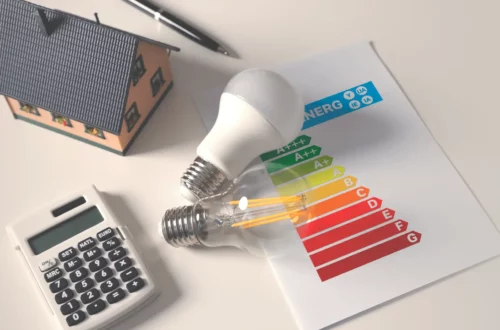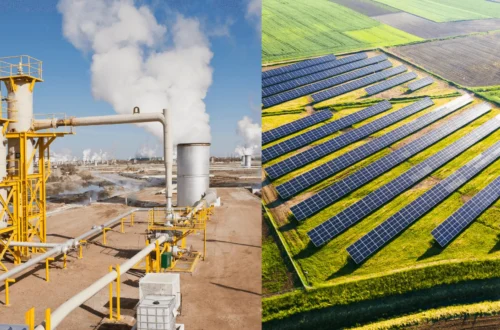Top Renewable Energy Sources for a Better Future

Are the rising costs of conventional energy sources becoming an ever-increasing burden?, or do you fear its adverse impacts on our planet, leaving you frustrated? Well this blog can provide the solutions. In it we shall delve into renewable energy sources which not only conserve our environment but will also reduce expenses.
Are You Concerned with Sustainability? Renewable energy sources such as solar power, wind turbines, geothermal systems, hydroelectricity and biomass energy play an invaluable part. Not only are they effective tools in maintaining environmental well-being; but also affordable and accessible options are readily available today.
Welcome to the exciting world of renewable energy! In this blog, our aim is to present an objective analysis of its advantages, limitations and future possibilities, along with benchmarks set by some countries and cities in adopting it. By the time your read concludes, you’ll gain an in-depth view into how clean sources like these are shaping our collective future.
If you are passionate about protecting the environment or exploring deeper into economics, this blog offers invaluable resources and unique perspectives in each topic area. Here you’ll find plenty of info that provides deep dives into each issue at hand!
Benefits of Using Renewable Energy

As part of your quest towards creating a more eco-friendly future, it’s crucial that you recognize all of the advantages associated with renewable energy sources such as wind or solar. Here are a few benefits associated with transitioning toward these alternatives:
1. Reducing Greenhouse Gas Emissions:
Reduced greenhouse gas emissions is key. In order to accomplish this goal, switching towards renewable energy sources such as wind power versus traditional methods emitting far fewer greenhouse gases can make an incredible impactful statement about climate change and contribute to healthier practices that protect both present and future generations of life on Earth.
2. Cost-Effective:
Utilizing renewable energy sources can be an economical investment over the long haul, given their steadily advancing technologies – one should expect reduced costs over time as renewable technology matures and advances further.
3. Improved Energy Security:
Renewable energy could provide reliable and consistent power solutions, unlike non-renewable options that could be affected by supply constraints, price volatility or geopolitical tensions – this makes renewables ideal options for homes or businesses looking for secure power sources.
4. Job Creation:
Transitioning to renewable energy technologies brings many employment opportunities for workers as new manufacturing, installation and maintenance positions are created within local economies – contributing greatly towards long-term sustainability in your community.
Solar Energy

For those seeking renewable energy sources, solar is an outstanding renewable option. According to the International Energy Agency’s figures on global solar capacity expansion during 2010, despite COVID-19 pandemic’s challenges, an incredible addition of 97 gigawatts was reached worldwide – over 50% of new electricity generation enhancements globally last year came from solar installations! These impressive numbers demonstrate solar’s potency in terms of greenhouse gas emission reduction – making solar an attractive source for homes and businesses seeking greener alternatives.
Solar energy offers us sustainable power for the future. Here are a few advantages of this renewable source:
1. Cost-Efficient:
Solar energy has become more cost-efficient over the years, making accessing and affording it simpler for consumers. Its price has decreased considerably making solar an accessible and attainable energy option for everyone.
2. Energy Efficient:
Solar panels offer an effective solution to help reduce your energy consumption. Thanks to recent technological innovations, these solar panels are increasingly efficient even on cloudy days; making solar power generation both convenient and cost-effective.
3. Solar Energy Is Friendly to the Environment:
Solar power energy can be considered one of the greenest forms of energy available as it doesn’t emit harmful pollutants that contribute to climate change.
4. Longevity:
Solar panels require minimal upkeep, boast a lifespan of 25-30 years and offer reliable electricity supply over this span. This makes solar power an attractive long-term source of power generation solution.
5. Versatility:
Solar power can serve many different uses – electricity generation, water heating and vehicle propulsion are among them. It offers numerous opportunities for use!
Solar energy could soon become the largest electricity source by 2050, which will significantly decrease greenhouse gas emissions and mitigate climate change effects.
Wind Energy
Have you heard? Wind energy has grown increasingly popular as an environmentally sustainable form of renewable energy in recent years; according to the Global Wind Energy Council there was an installed capacity of 743GW as of December of 2020 worldwide – providing us with ample power supply that meets sustainable energy demands.
Wind energy can be harnessed using huge turbines that capture wind’s kinetic energy and convert it to usable electricity through their large blades, while their mechanical energy production is transformed via generator into usable electrical power for sustainable electricity generation. Overall, harnessing wind power may prove an efficient means of producing renewable electricity supplies.
Benefits of Wind Energy
1. Renewable wind energy is an eco-friendly form of power generated from Earth’s wind resources that never runs out or depletes, providing you with reliable service year after year.
2. You can count on this powerful energy source without worry; its zero emissions and pollutants mean it won’t harm the environment.
3. Wind turbines offer an efficient power solution with minimum land requirements, saving space by their compact design. Their efficiency means reduced costs over time while their optimal space-saving is increased further still.
4. Are You Aware That Wind Energy Is an Affordable Source Of Electricity Production? Operating costs for wind energy generators have become lower over time as has its price.
Disadvantages of Wind Energy
1. Wind turbines installed too close to residential areas may produce excessive amounts of noise that could become disruptive and annoying to those living nearby.
2. Wind turbines may occasionally endanger birds and bats when spinning, leading to negative ecological implications and ecological harm.
3. If your community is considering wind turbines as an investment option, keep in mind the high initial investment cost can make the technology unfeasible in certain cases.
4. Wind energy provides an exciting solution to our renewable energy needs with tremendous expansion potential. As technology improves and costs come down while efficiency grows, wind power has the ability to be an invaluable source for meeting future energy demands.
Hydro Energy

Hydro energy (or hydro-power, as its more commonly known) has long been recognized as an invaluable renewable source. According to the International Energy Agency’s estimates of renewable electricity generation worldwide in 2019, hydro power accounted for 61% – which shows just how essential hydro energy is when meeting our sustainable energy demands.
Hydro energy refers to using the kinetic energy from flowing or falling water as the basis of our electricity generation process. Hydroelectric power plants transform this kinetic energy from rivers into electricity that is then distributed throughout homes and businesses for their electrical needs.
Benefits of Hydro Energy
1. Hydro energy can provide reliable and consistent source of power.
2. It is a low-cost source of power generation.
3. It’s eco-friendly and doesn’t emit harmful pollutants.
4. It boasts an extended lifespan and low maintenance cost.
Hydro Energy’s Challenges
1. Hydro energy relies on access to suitable rivers or bodies of water for generation.
2. Damming of rivers may have adverse environmental impacts.
3. Climate change has an immense effect on water resources and hydro energy production.
According to the International Energy Agency (IEA), hydro energy accounted for 16% of world electricity production in 2019 as reported. China, Canada, Brazil, USA and Russia produced the most hydro-power. You may find these facts about hydro energy production interesting!
Geothermal Energy

Did you know that geothermal energy is a form of renewable energy that taps the planet’s heat source to generate electricity? According to the International Renewable Energy Agency, world installed capacity for geothermal power had grown from zero in 2015 up to an astonishing 14.9GW installed capacity by end 2019. Geothermal plants use steam or hot water produced naturally as heat source to power turbines which generate electricity directly.
Have you considered geothermal energy as an eco-friendly source of power? Often overlooked despite having tremendous potential and minimal environmental impacts, geothermal power taps into the earth’s thermal energy to generate electricity – and there are numerous compelling arguments why geothermal should be on your sustainable lifestyle radar:
1. Geothermal Energy Is Abundant and Dependable
Geothermal energy comes from Earth’s core where constant heat production occurs, making this source of power an accessible and dependable option that could fulfill 3-5% of America’s total energy demands; an impressive figure compared to other renewable energy sources. You could look into geothermal as an energy solution when seeking alternative electricity supplies for consumption purposes.
2. Eco Friendly Solutions
Are you curious to understand more about geothermal energy as an alternative source? Compared to conventional sources, geothermal produces no greenhouse gases and has much lower environmental impact; plus its harnessing results in negligible waste generation without needing for combustion-based fuels like coal.
3. Diverse Applications
You can utilize geothermal energy in many different applications, from producing electricity to heating and cooling your home. Geothermal power plants have the capability of powering entire cities while ground-source heat pumps offer temperature regulation within individual households – all making geothermal an invaluable sustainable power resource.
4. Longevity
Geothermal energy systems provide reliable sources of power with long lifespan. Some geothermal power plants have operated continuously for over fifty years attesting to this technology’s long lifespan and resilience – meaning you can reap its advantages for decades without fearing interruption or inconsistency in supply.
Biomass Energy

Biomass energy is an eco-friendly renewable source that harnesses organic matter like wood, crops, agricultural waste or even municipal trash for energy production. In 2019 alone, according to Energy Information Administration estimates, approximately two percent of American power was generated using biomass – even this small contribution can go a long way in creating sustainable energy solutions!
Biomass energy has long provided humanity with power, making it one of the main renewable energy sources worldwide. Harvested from organic matter such as plants, wood and crops which can then be converted to various types of energy for further use.
How Does it Work?
Biomass can be converted to usable energy through various processes. You may either burn it directly for heat and steam generation while simultaneously producing electricity as by-product; or use biodiesel/ethanol production processes like anaerobic digestion/gasification/pyrolysis as additional forms of biomass energy production.
What are the advantages of biomass energy?
Do you know the incredible advantages of biomass energy? It is carbon neutral, meaning it only releases as much CO2 into the atmosphere as was absorbed during plant growth, making it an eco-friendly and sustainable source of power that contributes to a cleaner planet for future generations. By opting for biomass power you can lower your carbon footprint while helping make our world healthier than before!
Did you know that using biomass energy sources as an energy source is beneficial not only to our environment but can also create job opportunities within agriculture and forestry industries? Furthermore, when we decrease reliance on imported fossil fuels our local economies benefit significantly – consider making biomass part of your energy strategy today to protect both planet and economy!
What are the limitations of biomass energy?
Biomass energy provides us with an alternative fuel source that we can utilize to lessen our reliance on fossil fuels, yet its increased use brings with it increased concerns regarding potential environmental ramifications of this form of energy production. By adopting sustainable management practices instead, however, we can minimize any negative environmental repercussions like deforestation, biodiversity loss and air pollution typically seen with other forms of energy production.
Please be mindful that producing biomass energy may require substantial land usage for growing crops, thus potentially decreasing capacity for food or other diverse uses.
Also read: Renewable Energy vs Fossil Fuels: Which One is Better?
Future of Renewable Energy
Changing our planet for good starts with making an impactful step or two yourself; switching to renewable energy sources is one such measure which may surprise you in its impactful results. Below is an overview of some top renewable options which could bring us one step closer towards creating a brighter tomorrow.
1. Solar Energy:
Solar power is an exceptional form of renewable energy which harnesses sunlight to generate electricity, with technological developments making solar panels ever more affordable and efficient. According to estimates by the International Energy Agency, “solar PV will soon outstrip other forms of generation in many countries”. When considering your options for renewable sources of power generation, keep solar in mind as an economic option that has immense potential.
2. Wind Energy:
Wind turbines harness the wind’s power to generate electricity that can power homes and businesses worldwide, becoming one of the fastest-growing sources of power generation globally according to AWEA (American Wind Energy Association). Wind has also become cost-effective alternative source for power production as reported by this body.
3. Geothermal Energy:
Geothermal energy harnesses Earth’s heat to generate electricity, offering immense growth potential in regions with abundant geothermal resources. As an eco-friendly renewable option, this geothermal alternative may play a significant role in creating an alternative sustainable energy mix in our future energy mix. You can investigate this promising source of power to ensure uninterrupted power supply while contributing towards creating a cleaner planet and contributing towards sustainability goals simultaneously.
4. Hydroelectric Energy:
Hydroelectric energy utilizes water’s flow to generate power, offering an effective method for producing electricity for over 100 years. This proven technology offers reliable electricity production.
5. Tidal Energy:
Tidal energy utilizes ocean tide strength to produce electricity, yet researchers see significant growth potential with further studies being performed on this renewable approach.
6. Biomass Energy:
Looking for an energy source that’s carbon neutral when done sustainably? One option may be biomass energy. This source involves burning organic material like wood chips or crop waste in order to produce heat or electricity for heating or power production.
7. Wave Energy:
Wave energy harnesses ocean waves as energy production sources. Although still in research and development stages, its potential growth continues to expand as more efficient methods become available in this sector.
Challenges Facing Renewable Energy

As we transition towards more environmentally sustainable energy solutions, renewable energy sources like wind, solar and geothermal have seen increasing popularity. But even as their demand rises, renewables still face significant hurdles that need addressing in order to realize its full potential.
1. Intermittent Energy Sources
As is widely acknowledged, renewable energy sources such as solar and wind can be highly variable due to weather-dependent production cycles and production fluctuation; consequently requiring storage and distribution solutions that ensure consistent energy supplies for business operations.
2. Costs
It is essential that anyone considering renewable energy sources take note that, although its technology has become more affordable over time, initial expenses may still prove prohibitive for individuals or organizations alike.
3. Infrastructure
To construct an energy infrastructure of renewable origin requires significant time, money and resource investments as well as careful consideration in regards to location – particularly transmission lines, substations and any necessary additional elements of infrastructure like storage tanks that need be constructed or renovated.
4. Grid Management
Administering an electric grid incorporating renewable energy sources can become challenging as their contribution grows. Grid operators need to implement innovative systems and technologies in order to balance supply with demand and guarantee reliable operation of their network.
5. Opposition
Achieve public support is crucial when planning and building renewable energy projects; yet this can prove challenging due to opposition that arises often from various corners. Effective communication and engagement with the community are vital in order to overcome such hurdles.
6. Policy and Regulation
To create a sustainable energy future, policies and regulations which support renewable energy development must exist. Unfortunately, making changes requires time due to various vested interests influencing them – thus slowing the process down considerably. Therefore it’s crucial that governments recognize this obstacle while working toward making positive environmental improvements within governments in the form of legislative amendments that lead to sustainable future energy solutions.
7. Environmental Implications
It is essential that anyone considering renewable energy understands that while wind and solar may produce less greenhouse gas than fossil fuels, their construction and operation still has environmental ramifications – hence why environmentally conscious development of such projects should always take precedence.
8. Energy Access
Communities worldwide continue to face issues surrounding insufficient electricity supply, making the use of renewable energy sources an absolute priority in order to expand access for those most in need of power. By making renewable projects inclusively developed, energy can become available more widely and properly used by those most needy of it.
Despite its numerous challenges for sustainable future use, renewable energy remains an attractive solution that may bring many potential advantages.
Also read: The Complete Guide to Powering Your Home with Renewable Energy
Conclusion
For businesses aspiring to a sustainable future, understanding renewable energy sources is vitally important for making informed decisions. Solar, wind and geothermal power have all made important contributions in recent years; with Solar Energy leading as its capacity continues to increase by more than 50% each year! Furthermore, renewable sources like these tend to have minimal or no environmental impacts compared to non-renewable ones – choosing these renewable alternatives could do great good both to your company as well as our planet in numerous ways.




